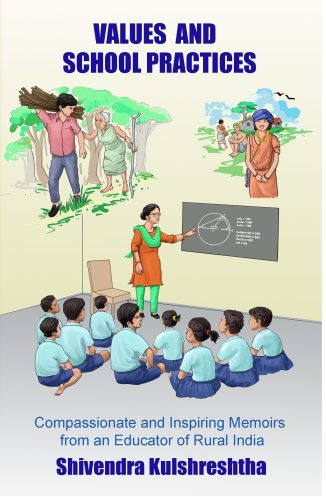Interview of Shivendra Kulshreshtha about his new book Values and School Practices

Congratulations on the release of ‘Values and School Practices’. Tell us something about your book. Some highlights of the subject.The name of your book is a bit different. What do you want to establish through this book?
Thank you! The word ‘Values’ has been included in the title because this book contains stories related to human values such as compassion, care, trustworthiness, honesty and perseverance. Apart from them, democratic values of fraternity, justice and equality have also been introduced indirectly. For these values, the incidents of discrimination, atrocities and unconscious bias against the scheduled castes and tribes have been given to arouse sensitivity of readers for eradication of these evils from society. All these values have been illustrated through stories of true events happening in or around the Schools, so, the word ‘School Practices’ was required to be added in the name of the book.
School Practices are related to the activities and behaviour of students, teachers and parents in the functioning of school. So, the stories related to interpersonal relationships, problems of adjustment of students and role of teachers and principal are included in this book. The glimpse of lives of tribals is included with a view of school community relationships . Therefore the title ‘Values and School Practices’ seems to be justified.
I think that my book will inspire the readers to lead virtuous lives with exuberance for working more efficiently and treating needy and downtrodden people with fairness and compassion. I hope my book will be a good resource material for attitudinal change of teachers and counsellors in tribal and residential schools
What kind of books inspire you as a writer? Who are your favorite authors?
I am not an extensive reader but I like to read religious books of different religions. I like to read books of struggles of poor people and women in India and racial discrimination in America. The stories of Prem Chand have immensely inspired me to think about the pathetic condition of poor people of rural India. The stories of Sharat Chand Chattopadhyay have impressed me too much. The women were neglected during those days but he has elevated the women characters in some of his stories. A few foreign writers have also impressed me for writing this book. ‘Speed of Trust’ by Steven Covey tells about the characteristics of trustworthiness , ‘The Theory of Thin Slices’ by Gottman explains the effects of communication skills in building relationships and the book on adjustment by Shaffers & Shaven has helped me to have a clear understanding of psychological aspects of human behaviour.
As regards my favourite authors, I can’t tell you any particular names. After my retirement I couldn’t have the opportunity to visit the library regularly. I had to travel from Bhopal to visit my sons at different places in the U.K. and America almost every year.
Tell me something about yourself. As an educator what improvements do you want to make in our current education system? What past experiences compelled you to write this book.
I have served in tribal areas for 26 years and then I served for 9 years as principal in a Navodaya Vidyalaya and then promoted as an officer to supervise these schools. Due to my services to tribal children for a long duration, I have developed an attitude of unconditional acceptance for the children of poor and downtrodden communities. I have treated such children with compassion, positive expectations and sincere efforts to bridge the gap of their early learning. In establishing the first residential school for tribal students and Navodaya Vidyalaya I had tried to lay noble traditions of an affectionate environment of a happy home. These schools had developed a culture of cooperation, care and responsibility feelings without any strict administration or rigidity. I was keen to provide best possible living facilities and care to the students as if they were my own children. I am a trained counsellor, so I was there to resolve psychological problems of students.
As regards my suggestions I have found that education of tribals is still being neglected. The district and higher level administration of education is in the hands of officers who have not any background of teaching. They simply organise the schemes of financial assistance to tribals and sanction funds and scholarships. So, the supervision of schools is in shambles. Anganwadis and primary schools are not functioning well. Therefore the preparation of children for middle and secondary schools remains deficient. Even the residential schools such as Ashrams, Adarsh schools are unable to make any remarkable impact in tribal education. Free coaching classes for students of scheduled castes and tribes after passing Higher Secondary school are being organised by government. But there is not any scheme of diagnosis of deficiencies of learning and classes for advance placement of SC, ST and poor children at the time of admission in class VI. Even Jawahar Navodaya Vidyalayas are not taking any action in this regard. The private coaching and malpractices in the private institutions of higher learning have created a large gap in the learning environment and opportunities of poor students. Therefore stringent actions are necessary to solve these problems.
Since I had been a teacher in tribal areas for a very long duration, I have identified myself with tribals and poor people. I have learned from the lives of tribals how one can live in a hut of grass and eat in one earthen pot everyday. This experience has made me not crave for money or physical amenities. I have an unconditional acceptance and belongingness with the poor and downtrodden people. My objective of writing this book is to motivate readers to be conscious of the suffering of these people and renounce their prejudices against them.
What inspires you to write? Who inspired you to become a writer?
I wish people to be virtuous, exuberant, to take actions for their advancement and rise from the motives of greed and selfishness. I have posted several messages on Facebook regarding interpretation of concepts of Gita such as contentment, serving people without attachment, equanimity in all circumstances. Sometimes the posts were related to relationships, adjustment, perseverance and elevating self esteem. Earlier I had written articles on the subjects of education and counselling in schools.
As regards who inspired me to become a writer, I recall that my confidence and enthusiasm for doing something evoked from the comment of a new visitor in America. On hearing the incident of finding a silver bracelet when I had no food to eat or money to buy it, he told me that I was endowed with abundant blessings of God and I could be successful in anything that I would venture. Then the story ‘Shadowland of Dream’ by Alex Haley made me decide to become a writer. His story of becoming a successful writer with the stories which were told by his father and relatives, motivated me to write stories based on the incidents of my teaching career and experiences of early life.

Tell us the preliminary concept of the ‘Navadaya Vidalaya’ from your point of view.
The Navodaya Vidyalayas are opened to provide the opportunity of quality education to the talented rural children in a residential school in every district. The quality education includes adoption of Indian culture and inculcation of values. The activities are the best source of satisfaction and enjoyment for the students of a residential school, so, multifarious activities should be organised in these Vidyalayas. These Vidyalaya should be just like a happy home full of faith and jest among students, teachers and principal. with proper understanding of needs, expectations and problems of each other. Navodaya Vidyalayas should be the centres of excellence, not only with the super infrastructure and highly qualified staff but new teaching strategies and innovations should bring a remarkable change for better learning and growth of students. The concept of pace setting school has not being implemented in true spirit. These Vidyalayas have not a proper liaison with neighbouring schools to lead them for qualitative improvement in education. They are not making intense efforts in conducting activities social awakening in the nearby community.
But it’s a matter of satisfaction that migration scheme and teaching of third language has been successfully implemented and so, the students of Navodaya Vidyalayas are committed to national integration. It’s good to see that the students in Navodaya Vidyalayas are learning to be free from the mentality of segregation on the basis of castes, language, region and religion. Since majority of students come from rural quota and belonging to the scheduled castes and tribes, they have a greater sensitivity to the problems of poor and downtrodden people.
Are you planning to publish more books to share your experience and knowledge?
At present, I have to see the response and suggestions of readers for at least two years.
Please share your most memorable moment as an educator with us.
Teaching is not a repetition of lessons in the classroom every year but every moment for a teacher is to be observant and and sensitive to the changing environment and learning capabilities of students. Once in a staff meeting I was surprised to see that one of my colleagues had raised the issue “Why tribal students don’t express their gratitude for teachers in spite of their sincere efforts and dedication”. We had realised that there was a need of changing our attitudes and prejudices against the tribal students. From that day I had always remained conscious and patient to bring a joy of success in learning by the tribal students.
Any words of advice from your experience for young authors and educators to encourage them.
This is my first book, so it would be just like encroaching my limits. Still I dare to say that for story writing one should be sensitive to identify certain issue or morals from the event happening before him or something coming to his imagination. From this he can decide the purpose and environment of the story. He can start with the explanation of concepts related to his objective or the background of characters. Then the story is narrated with suitable dialogues, description of environment, specific nature of characters. The story should be concluded by directly or indirectly conveying the message. If the message pertains to change the mindset of readers, a few questions may be posed to motivate them to think and read further on the subject of the story.

